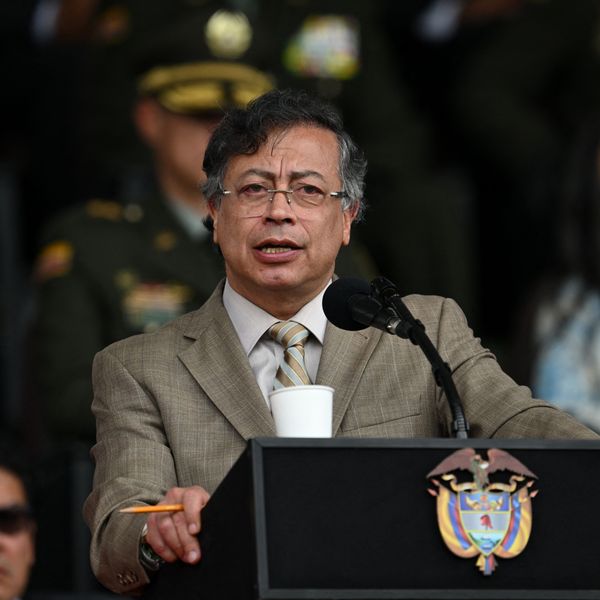To Combat Failed "War on Drugs," Uruguay Takes Latin American Lead on Pot Legalization
'Provides a model for legally regulating marijuana that other countries, and US states, will want to consider'

A bill in the nation's lower house of Congress was passed late Wednesday night and is now headed for the upper chamber where it is expected to pass. Uruguay's president, Jose Mujica, supports the measure, though he says he never tried marijuana himself.
There has been much talk in recent years among the Latin America countries about updating government attitudes towards drugs after decades of what critics see as a failed "drug war" which has cost billions of dollars, resulted in enormous bloodshed, and done nothing to end the illicit drug trade.
"Uruguay appears poised, in the weeks ahead, to become the first nation in modern times to create a legal, regulated framework for marijuana," John Walsh, a drug policy expert at the Washington Office on Latin America, explained to the Associated Press. "In doing so, Uruguay will be bravely taking a leading role in establishing and testing a compelling alternative to the prohibitionist paradigm."
Other experts on drug policy welcomed the development and credited Uruguay for taking the lead on the issue.
"Sometimes small countries do great things," said Ethan Nadelmann, executive director of the Drug Policy Alliance. "Uruguay's bold move does more than follow in the footsteps of Colorado and Washington. It provides a model for legally regulating marijuana that other countries, and U.S. states, will want to consider - and a precedent that will embolden others to follow in their footsteps."
And Nadelmann's colleague, Hannah Hetzer, who heads the DPA's Latin America office from Montevideo, Uruguay, said the goal of the legalization process is for Uruguayans to more maturely face the reality of drug use that is going on all over the world.
"At the heart of the Uruguayan marijuana regulation bill is a focus on improving public health and public safety," she said. "Instead of closing their eyes to the problem of drug abuse and drug trafficking, Uruguay is taking an important step towards responsible regulation of an existing reality."
_______________________________________
An Urgent Message From Our Co-Founder
Dear Common Dreams reader, The U.S. is on a fast track to authoritarianism like nothing I've ever seen. Meanwhile, corporate news outlets are utterly capitulating to Trump, twisting their coverage to avoid drawing his ire while lining up to stuff cash in his pockets. That's why I believe that Common Dreams is doing the best and most consequential reporting that we've ever done. Our small but mighty team is a progressive reporting powerhouse, covering the news every day that the corporate media never will. Our mission has always been simple: To inform. To inspire. And to ignite change for the common good. Now here's the key piece that I want all our readers to understand: None of this would be possible without your financial support. That's not just some fundraising cliche. It's the absolute and literal truth. We don't accept corporate advertising and never will. We don't have a paywall because we don't think people should be blocked from critical news based on their ability to pay. Everything we do is funded by the donations of readers like you. Will you donate now to help power the nonprofit, independent reporting of Common Dreams? Thank you for being a vital member of our community. Together, we can keep independent journalism alive when it’s needed most. - Craig Brown, Co-founder |

A bill in the nation's lower house of Congress was passed late Wednesday night and is now headed for the upper chamber where it is expected to pass. Uruguay's president, Jose Mujica, supports the measure, though he says he never tried marijuana himself.
There has been much talk in recent years among the Latin America countries about updating government attitudes towards drugs after decades of what critics see as a failed "drug war" which has cost billions of dollars, resulted in enormous bloodshed, and done nothing to end the illicit drug trade.
"Uruguay appears poised, in the weeks ahead, to become the first nation in modern times to create a legal, regulated framework for marijuana," John Walsh, a drug policy expert at the Washington Office on Latin America, explained to the Associated Press. "In doing so, Uruguay will be bravely taking a leading role in establishing and testing a compelling alternative to the prohibitionist paradigm."
Other experts on drug policy welcomed the development and credited Uruguay for taking the lead on the issue.
"Sometimes small countries do great things," said Ethan Nadelmann, executive director of the Drug Policy Alliance. "Uruguay's bold move does more than follow in the footsteps of Colorado and Washington. It provides a model for legally regulating marijuana that other countries, and U.S. states, will want to consider - and a precedent that will embolden others to follow in their footsteps."
And Nadelmann's colleague, Hannah Hetzer, who heads the DPA's Latin America office from Montevideo, Uruguay, said the goal of the legalization process is for Uruguayans to more maturely face the reality of drug use that is going on all over the world.
"At the heart of the Uruguayan marijuana regulation bill is a focus on improving public health and public safety," she said. "Instead of closing their eyes to the problem of drug abuse and drug trafficking, Uruguay is taking an important step towards responsible regulation of an existing reality."
_______________________________________

A bill in the nation's lower house of Congress was passed late Wednesday night and is now headed for the upper chamber where it is expected to pass. Uruguay's president, Jose Mujica, supports the measure, though he says he never tried marijuana himself.
There has been much talk in recent years among the Latin America countries about updating government attitudes towards drugs after decades of what critics see as a failed "drug war" which has cost billions of dollars, resulted in enormous bloodshed, and done nothing to end the illicit drug trade.
"Uruguay appears poised, in the weeks ahead, to become the first nation in modern times to create a legal, regulated framework for marijuana," John Walsh, a drug policy expert at the Washington Office on Latin America, explained to the Associated Press. "In doing so, Uruguay will be bravely taking a leading role in establishing and testing a compelling alternative to the prohibitionist paradigm."
Other experts on drug policy welcomed the development and credited Uruguay for taking the lead on the issue.
"Sometimes small countries do great things," said Ethan Nadelmann, executive director of the Drug Policy Alliance. "Uruguay's bold move does more than follow in the footsteps of Colorado and Washington. It provides a model for legally regulating marijuana that other countries, and U.S. states, will want to consider - and a precedent that will embolden others to follow in their footsteps."
And Nadelmann's colleague, Hannah Hetzer, who heads the DPA's Latin America office from Montevideo, Uruguay, said the goal of the legalization process is for Uruguayans to more maturely face the reality of drug use that is going on all over the world.
"At the heart of the Uruguayan marijuana regulation bill is a focus on improving public health and public safety," she said. "Instead of closing their eyes to the problem of drug abuse and drug trafficking, Uruguay is taking an important step towards responsible regulation of an existing reality."
_______________________________________

